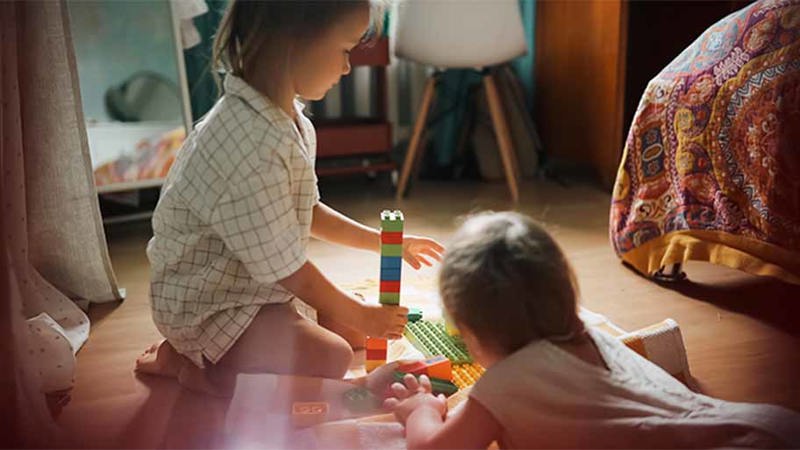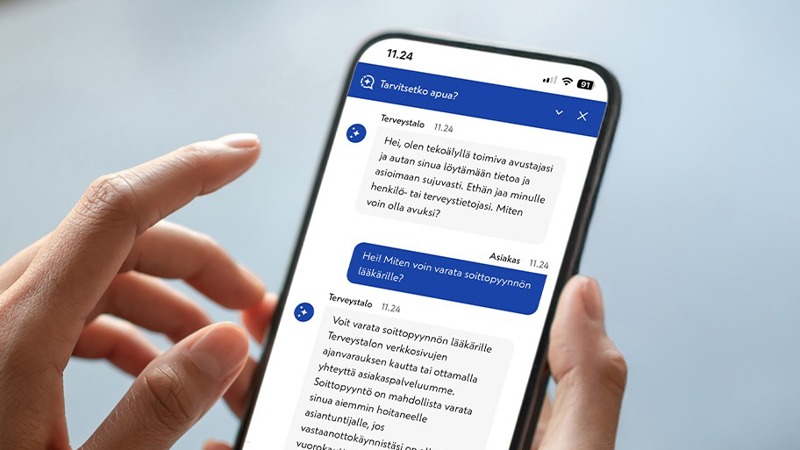Four relaxation exercises for the whole family for the Christmas rush
Christmas can be a busy and hectic time for families with children. A moment of peace and quiet with your family is an invaluable opportunity to enjoy Christmas.

The best Christmas gift for yourself and the whole family is recognising the need for breaks and relaxing together.
– When you think about where you feel tired and stressed most often, it's easier to stop when you need to. Some people feel more overstimulated when they are stressed, while others feel powerless and exhausted. Examples of the need for a break include stiff shoulders, poor sleep, a tense temper or feeling all over the place," says Katri Laine, a psychologist and trainer psychotherapist at Terveystalo.
– In young children, the signs are similar. On the other hand, children may also express tiredness, be serious and lie down," Laine continues.
Relaxation exercises are also worth doing with young children
Relaxation moments teach both adults and children to listen to themselves and to stop and think about themselves.
– With a safe adult, a child learns good self-regulation. The ability to stop and rest - a skill that carries through life - is also important. Age-appropriate calming exercises can be done with children.
– Young children cannot concentrate on still meditation or emptying their minds without stimulation. They need the help of a calm adult to relax.
Good relaxation exercises for the whole family
- It's easy for both adult and child to focus on touch. Giving a massage, stroking or running a feather along the body's boundaries, for example, will naturally make you stop. The adult can first stroke the child and then the other way round.
- Listening to a quiet song together under a blanket calms the body and mind.
- With slightly older children, you can listen together to a guided meditation exercise, for example.
- Everyday moments of relaxation are also calming: enjoying the warmth of the Christmas sauna together, lounging on the same sofa and reading, drinking mulled wine and looking at a candle or fireplace.
Calming moments restore the emotional connection with the self
We are constantly on the receiving end of information and stimuli in our everyday lives. As a result, we very easily lose touch with ourselves.
– When we are disconnected, we are unable to meet our own needs and take care of ourselves in the best possible way. When we calm down, we turn our attention from the stimuli of the outside world to our own bodies and minds. At best, this has a tangible effect on the body: our muscles relax, we sleep better, our chest gets bigger and our heart rate and blood pressure go down," says Laine.
Take it easy at Christmas: feeling good is not something you perform
Life is always random and uncontrollable.
– And even when things go according to plan, you can be left with an empty feeling inside. A good feeling doesn't necessarily come from doing. But the rewards of relaxation and calming down are quick: when the body relaxes and the mind lets go of obligations, you realise that you don't really need much else to feel good," concludes Katri Laine.
Read more occupational health articles

What is metabolic age and why should you care about it?
A new laboratory study by Terveystalo reveals how your body is aging. Metabolic age makes biological aging visible.

Smooth assistance for your needs – our AI assistant is now at your service
You can now find Terveystalo’s AI assistant on our website — a quick and easy way to get answers based on the information available on our site. For now, the assistant is available only on the Finnish‑language section of our website, but you can chat with it in English.

How technology helps relieve mental stress: "When the load is high, the threshold must be low."
Mental health disorders have overtaken musculoskeletal disorders, which had long been the leading cause of sick leave. Work is changing, and the range of sick leave caused by mental health issues has also changed. We must be able to offer new solutions to this challenge.

Extensive data set of 200,000 samples: Nightingale study reveals link between illness risks and sick leave
Data from the Finnish Nightingale study, which is used in Terveystalo's occupational health services, reveals a clear link between lifestyle-related health risks and sick leave. The exceptionally extensive data set of over 200,000 customers shows that people with a low risk of illness had significantly fewer absences, while those in high-risk groups had more absences. The results highlight the importance of preventive healthcare in ensuring work ability and the competitiveness of companies.

Strong identification speeds up your service experience when calling us
Soon you can identify yourself easily and securely before your call is answered. Read below to see how the identification process works.

Terveystalo's digital services have been awarded the internationally recognized ISO27001 information security certification.
Terveystalo's information security practices, processes, and risk management are in line with international best practices.